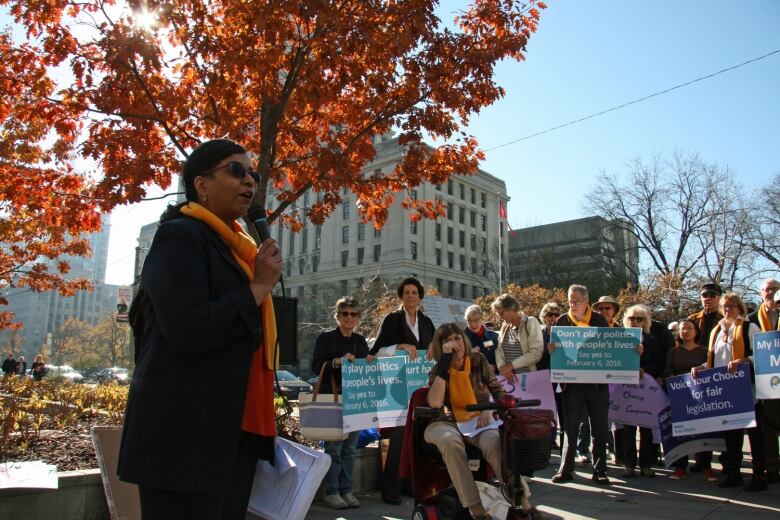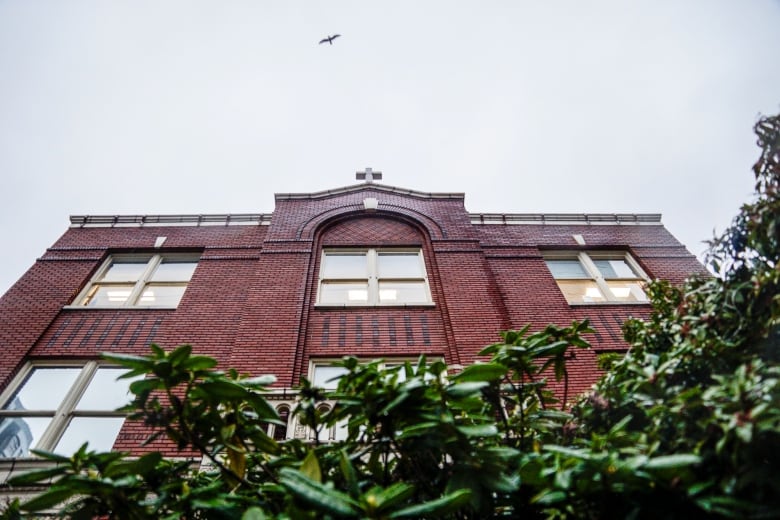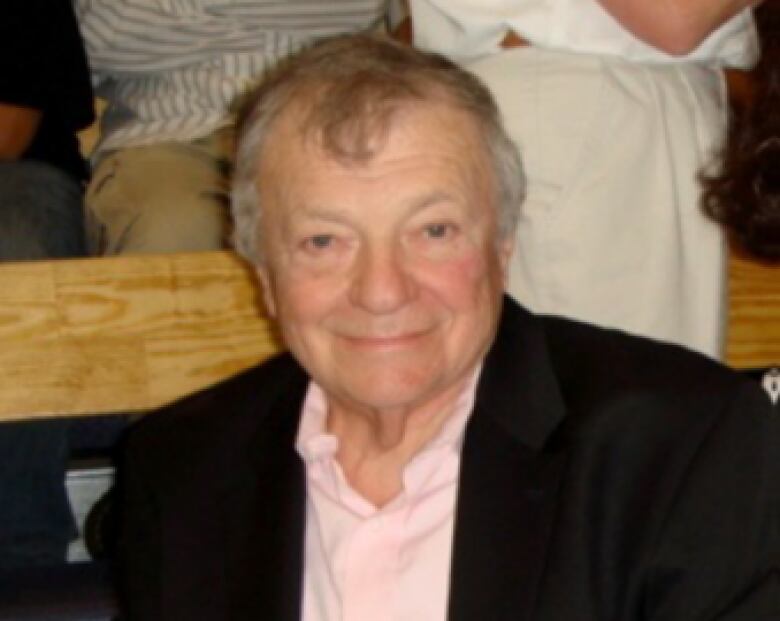Emails reveal hurdles for patients seeking assisted deaths at faith-based facilities
844 pages of FOI documents detail difficulties transferring Vancouver-area patients to access service

Barry Hyman's story is just the tip of the iceberg.
When the 83-year-old Vancouver man chose an assisted death inside his room at the Louis Brier Home and Hospital last year, he defied the Jewish facility's religious and moral mandate.
The standard protocol for people like Hyman is to transfer them to secular Vancouver Coastal Health facilities to access the service.
But a trove of emails obtained through a Freedom of Information (FOI) request shows the transfer process is fraught with problems, and medical professionals are bracing for escalating confrontations with patients who refuse to be moved to obtain a constitutionally guaranteed health-care service.
The 844 pages of correspondence were obtained by the advocacy group Dying with Dignity Canada. The group's CEO, Shanaaz Gokool, described the transfer process as "really bad medicine" that can be physically and psychologically traumatic for people who are already sick.
"You're suddenly faced with the jarring reality that in Canada, our principle of universal access to health care isn't universal," Gokool said.
"I think that's very distressing to people who are already going through a very difficult time."

The emails from Vancouver Coastal Health (VCH) and the Catholic care provider Providence Health Care date from the fall of 2016, just a few months after medical assistance in dying (MAiD) was legalized, until June 2017.
They give a behind-the-scenes look at logistical problems, potential risks to patients and "inevitable" future conflicts when publicly funded medical facilities refuse to allow assisted dying on site.
Unprepared
Getting a doctor's assistance to end the life of a terminally ill person is complicated. First, a patient has to make a written request, signed by two independent witnesses. Next, there are two separate medical assessments by doctors or nurse practitioners to make sure the patient is eligible.
Then there's a 10-day waiting period before a lethal dose of medication can be administered. It's a process that's made all the more complex when someone is in a hospital or care home that has opted out of medical assistance in dyingfor moral or religious reasons.
It means moving sick and often frail people at least once to receive a medical service they are legally entitled to access. If the facility also prohibits assessments onsite, as Providence does in most cases, yet another obstacle is added to the process. That's one reason representatives from Providence joined a working group with VCH staff to prepare for MAiD to be legalized in June 2016.
We got caught flat-footed last week on Medical Assistance in Dying, and we really need to develop a protocol as fast as possible- RabbiHillel Brody, chaplain of Louis Brier Home and Hospital
Providence was the only health-care provider not offering assisted dyingthat participated. At least six other residential care providers funded through VCH have chosen not to allow assisted dying on site, and none was involved in the working group
One of those was Louis Brier Home and Hospital, a Jewish nursing home on Vancouver's West Side. Emails between staff there and at VCH reveal a scramble to develop an assisted dyingpolicy in February 2017 eight months after the law changed and only after a resident had made a formal request.
"We got caught flat-footed last week on Medical Assistance in Dying, and we really need to develop a protocol as fast as possible," Rabbi Hillel Brody, Louis Brier's chaplain wrote in an email to VCH officials on Feb. 20.

Things haven't always gone smoothly for Providence, either.
The emails reveal at least one case where VCH had no offices available for a woman who urgently needed an assessment. They also include an emailed apology from Providence after another fragile patient was transferred to Vancouver General Hospital at a time when there were no beds available.
And they refer to the case of a dying man who was "peeved" to find himself in a Providence hospice after making it clear to his doctors that he wanted an assisted death.
Finding the space and resources at VCH for Providence patients to be assessed or to die "remains a significant and defining issue for PHC," Providence's then-director of ethics Dr. David Unger wrote to colleagues on June 10, 2017. His counterparts at VCH were doing their best to accommodate the extra workload, Unger said, but they were up against "a tremendous amount of push back" from their clinicians on the ground.
Losing capacity
There's a clear progression over six months of emails from Providence staff, showing a transfer process that gets smoother with each case.
But there's one consistent worry: Can patients be transferred to VCH before they lose the capacity to make such a weighty decision?
During a busy holiday season in 2016, Unger dealt with what he described as "formidable" hurdles to getting patients from Providence facilities to Vancouver Coastal Health in time.
One patient in particular was "in grave danger of losing capacity." Though she was transferred in time, Unger wrote that the process took long enough that "it certainly would look to the outside like we were dragging our heels."
"I just hope the family is not going to sell a story to the papers about how PHC dragged its feet on allowing [patients] to access MAiD," Unger told a colleague in a Dec. 31 email.

As of June 14, 2017, two of 17 Providence patients who had requested medical assistance in dyingdeteriorated to the point they were no longer eligible, according to a VCH presentation included in the FOI documents.
There's no suggestion those two patients were declined because it took too long to transfer them to VCH, but over the same time period, only two of 148 people living at home or in secular facilities deteriorated out of eligibility.
There's an inherent risk of losing capacity when someone has to be moved for their assessments, according to Darren Kopetsky, who oversees medical assistance in dyingfor VCH.
The situation at [Louis Brier] is a clear and present powder keg- May 18, 2017 email from Darren Kopetsky at VCH
But Christopher De Bono, Providence's vice-president of mission, ethics and spirituality, said he is not aware of any case where a patient lost decision-making capacity while he or she waited to be transferred.
"If there was any evidence that this was a risk ... that would be flagged very early on," De Bono said.
The big fight
Over the last 18 months, Providence has started making more and more exceptions to allow on-site assessments for patients who are too frail to be moved. But it has yet to encounter what happened at Louis Brier last spring, when Hyman and a second resident both demanded they be allowed to die in their room.
On May 18, Kopetsky addressed the standoff in an email to colleagues at VCH, writing: "The situation at [Louis Brier] is a clear and present powder keg."
Hyman defied the restrictions and died at Louis Brier on June 29, with the help of Dr. Ellen Wiebe.
He had been suffering the after-effects of a stroke and had been diagnosed with lung cancer.

Louis Brier has filed a formal complaint against Wiebe with the B.C. College of Physicians and Surgeons over the incident.
The fate of the second resident isn't clear, but before Hyman's death, Kopetsky wrote in an email that "a similar request [for on-site provision] is inevitable from patients of Providence Health Care."
He told CBC News earlier this month his feelings haven't changed. "I do think there could be a day when a patient seeks to challenge those restrictions," Kopetsky said.
"They might even petition the court to make a determination about whether the agency does in fact have the legal right to restrict that activity."
The emails show there has been at least one case where a patient has initially refused to leave a Providence facility for a medically-assisted death, but that appears to have been resolved.
Providence's Christopher De Bono said that if similar cases pop up in the future, his staff will respond "compassionately about the services that are offered and what an integrated system can offer."
An evolution
Over the last year, Providence's assisted dying policy has evolved as staff learn more about the needs of their patients, according to De Bono.
In mid-2017, the health authority assigned a social worker to handle the response for all assisted dyingrequests, which has streamlined the process.
"We've learned from our experiences," De Bono said. "We realized that aspects of our policy needed to be improved."
Louis Brier's CEO, David Keselman, wasn't available for an interview, but the home sent a written statement saying it "is committed to providing the absolute best care possible to all residents, that includes those who have chosen to undergo medical assistance in dying."
The statement says Louis Brier is learning from each case "to ensure that we address resident needs in the best possible way."
But Dying with Dignity's Gokool believes it's long past time for the provincial governments that regulate health care to step in.
"The purpose of those facilities is the delivery of health care to the communities that they serve. They're not there to support the political ideology of the policy-makers of those facilities," she said.
"That's why they receive taxpayer funds."
For more on this topic, tune into your CBC Radio One morning program for a new series: A Good Goodbye,an in-depth look at medically-assisted deathin B.C., running Jan.29 to Feb. 2.












_(720p).jpg)


 OFFICIAL HD MUSIC VIDEO.jpg)
.jpg)



























































































